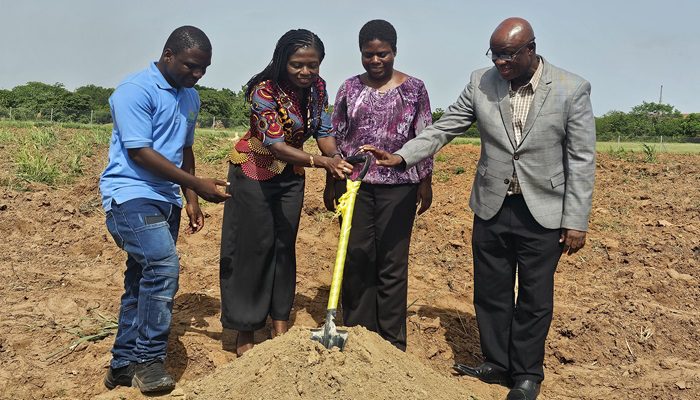MTN Ghana, in partnership with the University of Ghana’s Faculty of Agriculture and advisory group Defarmercist, has cut sod for a Vegetable Centre of Excellence at the University of Ghana Farms.
The initiative is part of the company’s broader commitment to youth empowerment and sustainable development through agriculture.

GH₵3m investment in pilot phase
MTN Ghana is investing GH₵3 million into the pilot phase of the project, with plans to expand depending on its success.
The centre will serve as a training ground for at least 300 young people over the next two years, focusing on modern, vocational agriculture.
Beneficiaries will receive both theoretical and hands-on training in crop production, greenhouse farming, marketing, and agribusiness management.
Graduates of the programme will be supported with access to land, tools, and market linkages to help them establish their own farms.
Equipping youth with practical skills
Speaking at the sod-cutting ceremony, the Chief Corporate Services and Sustainability Officer of MTN Ghana, Madam Adwoa Wiafe, said the project is designed to equip young people with practical agricultural skills while helping to tackle unemployment.
“We recognise the need to create jobs for the youth, and agriculture is one of the main support systems not just in Ghana but globally,” she noted.
She added that the initiative builds on a similar programme MTN ran last year for rural women, which focused on digital farming and boosting productivity on small plots.
Inclusive and scalable training model
The new centre, according to her, expands that vision by targeting a broader demographic and scaling up operations.
She indicated that training will be offered during university vacations to allow participation from non-students, with facilities including greenhouses and open-field farms.
Beyond training, she said the programme also aims to help lower the cost of vegetables in the local market by promoting local production at scale.
“This is not just about learning how to plant, it’s about making agriculture attractive, practical, and profitable. We want to dispel the myth that agriculture is only for a certain class or that it doesn’t pay. Whether you’re a university student or someone from the wider community, this project is designed for you,” she stressed.

Reducing imports and stimulating the economy
Madam Wiafe noted that reducing the country’s reliance on imported vegetables would help address pricing concerns and stimulate the local economy.
“This is a homegrown initiative. We don’t need to bring in consultants from outside. Everything is Ghanaian-led—from the training to the production—and it’s all about creating real, lasting impact,” she stated.
Structured training for job readiness
General Manager of Defarmercist, Charles Agyeman, detailed the structured approach of the training initiative, noting its two-phase model.
The first phase focuses on greenhouse and open-field production, while the second emphasizes commercial training.
According to him, the goal is to ensure that within four years, every agriculture graduate from the University of Ghana will be fully equipped to work in any agricultural firm—locally or internationally.
He stressed that the centre directly responds to long-standing concerns that agriculture graduates lack practical experience.
“We’re moving beyond theory. By integrating proven agricultural techniques from countries like Israel and the Netherlands with our local context, we’re ensuring that graduates can hit the ground running,” he said.
The programme kicks off with a month of intensive training, after which trainees transition to commercial production fields to apply their skills in real-world settings.
“This is about producing job-ready individuals,” Agyeman explained. “We want employers to find graduates who already understand the demands of the industry.”

Call for broader access to training
The practical, scalable nature of the programme also aligns with Ghana’s objective to reduce reliance on imported vegetables by ramping up local production.
Head of Dean Agric at the University of Ghana, Professor Eric Nartey, at the ceremony, called on MTN to invest in smart classrooms to expand training access to underserved groups.
“We want to train more young people, especially those from disadvantaged communities, using locally available expertise,” he added.
By CHRISTABEL OBOSHIE ANNAN, Accra




